Gender-ambiguous author Eve Langley is ripe for rediscovery. A new biography illuminates her difficult life
- Written by Donna Mazza, Senior Lecturer in Creative Arts, Edith Cowan University
Review: Eve Langley and The Pea Pickers by Helen Vines (Monash University Publishing)
When your subject is a mid-century, gender-ambiguous author who lived under other names and wasn’t always honest about basic points of identification, writing a biography is a huge challenge. But Helen Vines’ Eve Langley and The Pea Pickers builds a substantial picture of this elusive author.
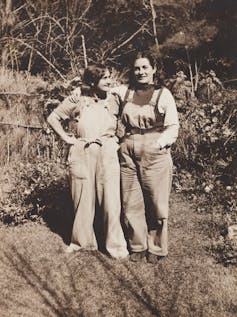 Eve (left) and June Langley, 1920s.
Courtesy of Monash University Publishing
Eve (left) and June Langley, 1920s.
Courtesy of Monash University Publishing
I first came to Langley’s work through her 1940 poem Native-Born as part of my research on dead kangaroos in Australian literature.
Langley had been absent from my educational curriculum, dominated by her male contemporaries — Kenneth Slessor, Nevil Shute and the school-boy squabbles of the Ern Malley affair — and the more influential Patrick White and Randolph Stow. This wasn’t unusual in the 80s and 90s. Now, it is hard to justify any more than a sprinkling of them in an English course.
Native-Born, however, is still startlingly relevant to contemporary ecofeminism by subtly linking the discovery and cremation of a dead female kangaroo to women and the nature of the Australian landscape.
Read more: Friday essay: hidden in plain sight — Australian queer men and women before gay liberation
Cross-dressing sisters
Born in remote New South Wales in 1904, Langley is best known for her first novel, The Pea Pickers (1942). It follows the journey of two young women who cross-dress so they can work as agricultural labourers in Gippsland during the Depression.
This novel was loosely based on Eve and her younger sister June’s experiences, and Vines’ biography includes evocative photographs of the two sisters in lacy dresses, and also in trousers, shirt and tie with their hair cut short and boyish.
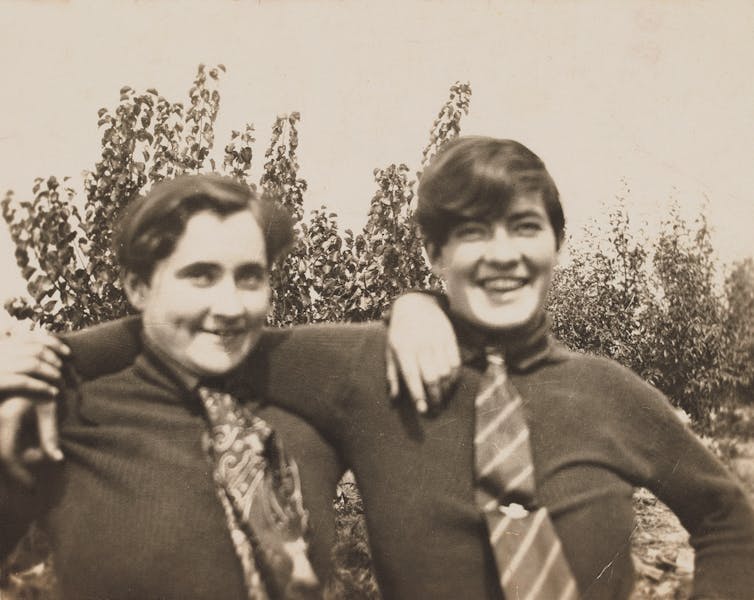 Eve (left) and June Langley, photographed in the 1920s.
Courtesy of Monash University Publishing
Eve (left) and June Langley, photographed in the 1920s.
Courtesy of Monash University Publishing
For contemporary readers with an interest in gender, Langley might well be poised to become an icon. Later in life, she changed her name to Oscar Wilde, hitching her wagon to another writer resisting the gender expectations of his times.
The previous authoritative biography of Langley, by Joy Thwaites, was published in 1989. According to Vines, Thwaites drew heavily on the fiction as a source of biographical content. This practice is never going to yield a definitive narrative of the author’s life, and Vines is sensitive to the limitations Thwaites faced in her research.
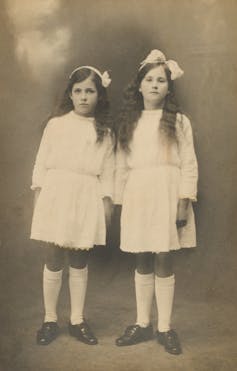 June and Eve Langley, c. 1913.
Courtesy of Monash University Publishing
June and Eve Langley, c. 1913.
Courtesy of Monash University Publishing
June Langley also contributed to the content of Thwaites’ book. It is clear from Vines’ writing there have been issues in digging out truth around the lives of both sisters. According to Vines, the girls’ mother was a serial liar about names, dates and facts, a habit both girls adopted. So it is admirable this biography illuminates so much without the need to cleave the truths from the lies the three women told about themselves and each other.
It is evident there was something to hide. In the final chapter, Vines considers evidence that Langley’s father was a cross-dresser who abused Eve as a child, and hypothesises much of the obfuscation had its roots there.
What remains as material evidence presents a maze of clues and trails.
Unpacking a puzzle
Eve Langley and The Pea Pickers is a puzzle built around correspondence from Langley’s editors and her sister, and a new reading of her writing and her family’s story in the public records.
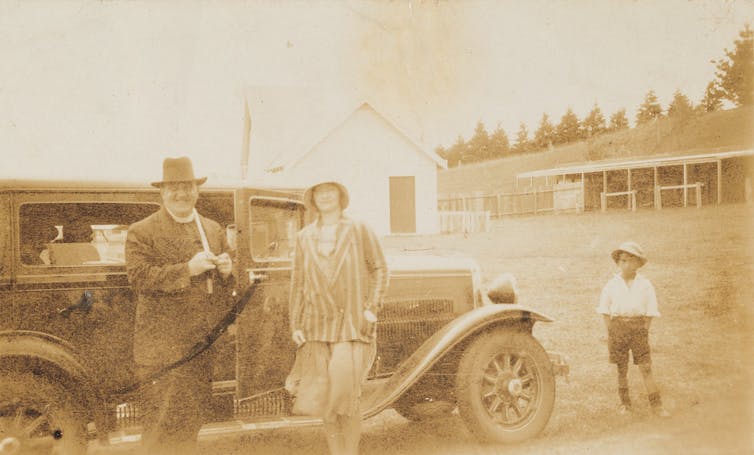 Eve Langley at ‘St Pats Picnic Racecourse Te Awa’ in the 1930s with Father O’Flynn.
Courtesy of Monash University Publishing
Eve Langley at ‘St Pats Picnic Racecourse Te Awa’ in the 1930s with Father O’Flynn.
Courtesy of Monash University Publishing
At times, the story is deeply sad. Langley’s first child, Luis, was born in 1935 to her lover Luigi Rinaldi in Auckland, but Luis died at three months. In 1937, Langley married “a great and glorious drinker”, Hilary Clark. They had three children by 1941: Bisi, Langley and Karl Marx.
Eve Langley was often a solo parent while Clark worked away, or escaped to calm his anxiety. In 1942, she was incarcerated for eight years in Auckland Mental Hospital. Vines points to Eve being a victim of childhood abuse and trauma, but no diagnosis is known and no records are available on her treatment.
Although her husband, sister and mother were in New Zealand, Langley’s children were put into an orphanage. She briefly reunited with them as adults, but, Vines writes, did not re-establish a parental relationship.
The sequel to the Pea Pickers, White Topee, was published in 1954 after Langley’s release from the asylum.
She continued to write, regularly publishing poetry in The Bulletin throughout the 50s and 60s. Two further novels and “some 4,000 closely-typed pages on pink paper” remain unpublished.
The chapter covering Langley’s relationship with her editors at Angus & Robertson over several decades details both her life and these editorial relationships. For many years, her work was published by Beatrice Davis, who began corresponding with June during Eve’s incarceration.
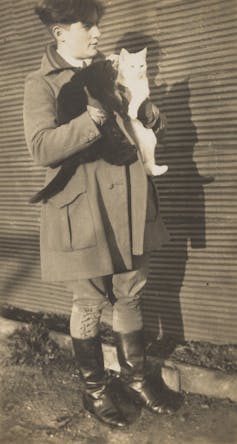 June Langley, c.1925, when she was dressing as a boy and calling herself Jim or Jimmy.
Courtesy of Monash University Publishing
June Langley, c.1925, when she was dressing as a boy and calling herself Jim or Jimmy.
Courtesy of Monash University Publishing
In Vines’ drawing on these letters it is clear a friendship developed between the editor and June, who shared her own judgements on Langley. The two sisters became steadily more estranged and their relationship reads as toxic, but Davis remained focused on Langley’s creative works.
The description of Langley’s death in Katoomba in 1974, where June also lived, firmly underlines the hostile nature of their relationship.
Vines’ final chapter draws together threads of evidence and tries to determine the true figure of Eve Langley. She considers the intergenerational impact of abuse, and concludes it wasn’t Eve who was gender-fluid, but her sister. It was Eve’s forthright use of this in her fiction which was central to the eventual “hate” June felt for her sister.
June, as a periodic cross-dresser, appears to unconsciously mimic her cross-dressing father. June’s identification of herself with her father and Eve’s identification of June with their father take on a sinister light. June, unconsciously all her life, keeps the abuse memory alive for Eve.
Fragmented families
The Pea Pickers is a lyrical novel, raw and modern for its time in Australian fiction. It’s plot is meandering, but the book is also feminist and sketches out a life of young women in Australia largely untold elsewhere.
It is ironic Langley’s writing was tied to ideas of family, when the family she was born into and the one she birthed were so fragmented. The biography tracks this in a substantial chapter, including re-examining The Pea Pickers, White Topee and the unpublished Wild Australia.
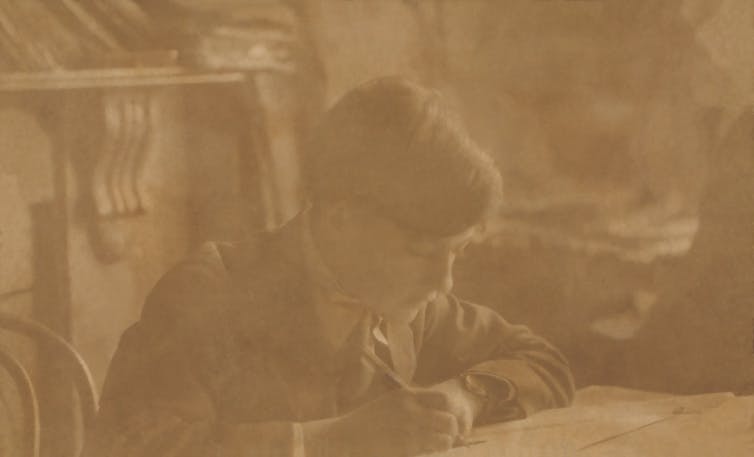 A photo of Eve Langley thought to have been referenced by Eve in The Pea Pickers.
Courtesy of Monash University Publishing
A photo of Eve Langley thought to have been referenced by Eve in The Pea Pickers.
Courtesy of Monash University Publishing
Vines examines sections of The Pea Pickers with a contemporary eye for gender and the representation of sisters Steve (Eve) and Blue (June) where:
Hirsute masculinity (Blue’s beard) is juxtaposed with female anatomy (her breasts) suggesting that a defining characteristic of masculinity — facial hair — is easily removed, while the feminine body is less easily disguised.
The fictional narrative and its depiction of two sisters who are intimately close is another point of sadness in this biography when considered against the breakdown of the real sisters’ relationship.
Eve Langley, with her articulate rendering of the environment and her thematic focus on gender ambiguity in her writing is ripe for rediscovery by a new Australian audience. Vines’ biography provides an excellent gateway into her life and her work.
Authors: Donna Mazza, Senior Lecturer in Creative Arts, Edith Cowan University




